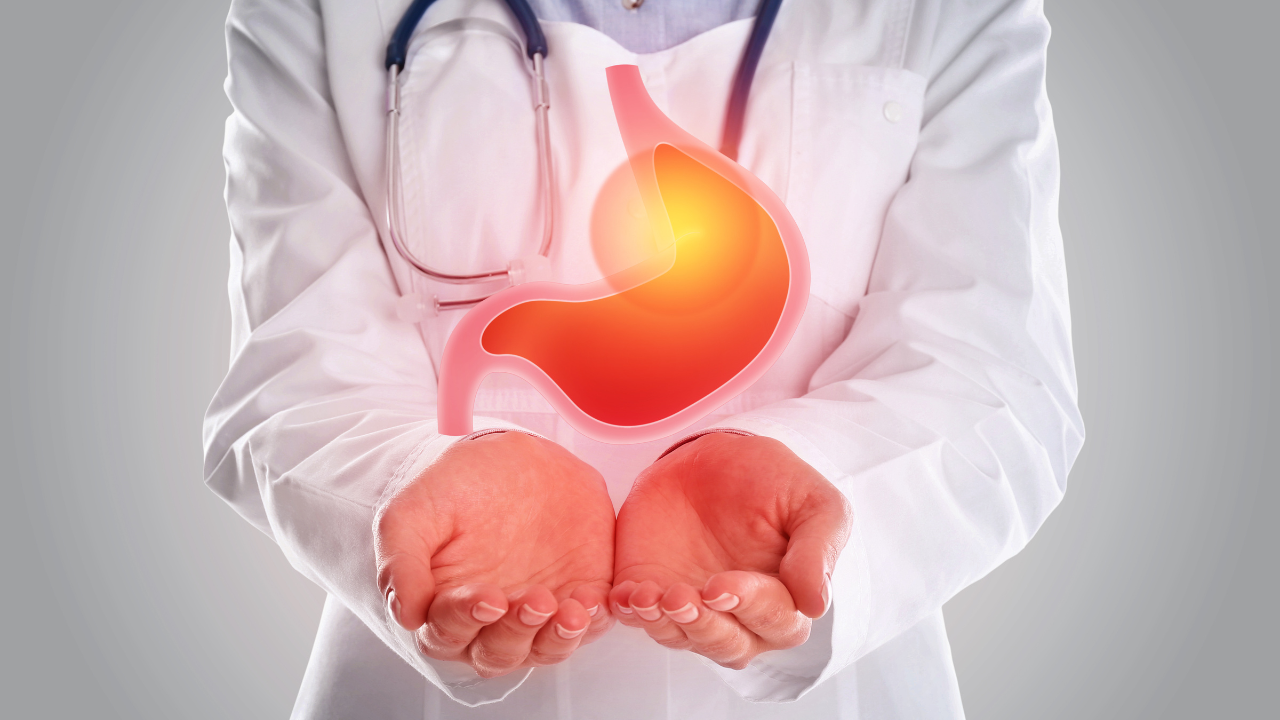Heartburn is something almost everyone experiences at some point. For many, it is an occasional discomfort after a heavy meal, late-night snacking or a highly stressful day. To some, heartburn becomes a regular companion, and this may signal gastroesophageal reflux disease, because GERD affects the same area as esophageal cancer, it is a natural concern, to worry about whether heartburn could be a sign of something more serious. Learning the differences between the two conditions can ease anxiety, will help one understand when it is important to consult a healthcare professional.
What is GERD (Gastroesophageal reflux disease)
Gastroesophageal reflux disease is a condition in which stomach acid repeatedly flows back into the esophagus. This acid belongs in the stomach, and when it rises into the esophagus, it irritates the lining. This irritation creates the familiar burning sensation in the chest or throat that most people refer to as heartburn. GERD tends to flare up after large meals, when lying flat soon after eating, or when consuming foods that relax or irritate the esophagus. These include spicy dishes, tomatoes, citrus fruits, chocolate, and caffeinated drinks.
Common symptoms of GERD include a burning sensation in the chest following meals, a sour taste in the back of the mouth, chronic coughing, throat clearing, hoarseness, and sometimes a feeling that food is rising again into the throat. While GERD can be uncomfortable and disruptive, it is usually very manageable. Adjusting meal sizes, avoiding late-night eating, and identifying food triggers often provide relief. Medications that reduce or block acid production can also offer strong improvement.
What is esophageal cancer?

Esophageal cancer begins with the uncontrolled growth of abnormal cells in the esophagus. Unlike GERD, this is a very infrequent condition, though much more dangerous. One challenge concerning the treatment of esophageal cancer is that it often starts quietly. Early stages may show no symptoms at all, which is why keeping an eye on changes, whether persistent or unusual, is important.Symptoms of esophageal cancer include difficulty swallowing, pain when swallowing, unexplained weight loss, a sensation that food is getting caught on the way down, or persistent discomfort in the chest. These symptoms do not necessarily indicate cancer, but they do deserve prompt medical attention so that the cause can be identified and treated.
What does current research say

According to research published in the National Institute of Health, Gastroesophageal reflux disease was associated with a significantly increased risk of esophageal and laryngeal cancers. Conversely, the observed lower risks of colorectal, liver and pancreatic cancer among individuals with GERD may be attributable to earlier detection and treatment of precancerous lesions resulting from more frequent healthcare utilisation. This research sourced data from the National Health Insurance-National Health Screening Cohort, a randomly selected cohort comprising 10% of screening participants in 2002-03, followed until 2015.
Overlapping symptoms
Because they affect the same part of the body, GERD and esophageal cancer share some symptoms. Overlapping symptoms can be quite confusing, but learning about their behavior can help you differentiate between them.Both can present with chest discomfort. Symptoms of GERD generally are a burning sensation beginning after eating, and can be alleviated with antacids. Discomfort related to cancer is less likely to improve with common heartburn remedies.Both conditions can include problems swallowing. In the case of GERD, problems swallowing usually stem from inflammation. They come and go. Swallowing difficulty in esophageal cancer tends to get worse and more noticeable over time. People may need to drink more water with meals or change to softer foods.Both conditions may cause symptoms of food moving up or not going through easily. GERD tends to give rise to regurgitation as a result of acid movement. Cancer can give a sensation of food physically sticking.Both can irritate the throat enough to cause cough or hoarseness. GERD often causes morning throat irritation from nighttime reflux. Cancer may cause throat discomfort later in the progression.
How these differences matter
While some symptoms may overlap, the pattern of the symptoms generally shows the way. Symptoms of GERD generally wax and wane. Symptoms are worse on some days and almost disappear on other days. They tend to have obvious triggers like heavy meals, lying down too quickly after eating, or specific foods. It also tends to respond well to lifestyle modifications and to acid-reducing medications.Esophageal cancer is different. Symptoms tend to be more persistent and often progressively worsen regardless of food choices or body position. Difficulty swallowing is one of the most significant signs to watch for because it does not often improve on its own. Unexplained weight loss is another symptom that indicates that a person should see medical professionals. Cancer symptoms also do not respond very well to simple heartburn medications.
Can GERD lead to esophageal cancer?
Most people with GERD will never develop esophageal cancer. In addition, long-standing untreated GERD can lead to a condition called Barrett’s esophagus. In Barretts, the lining of the esophagus changes in response to chronic exposure to acid. This condition somewhat raises the risk of developing cancer over many years. Many physicians recommend routine periodic checkups for people with Barretts so that early changes can be spotted and dealt with appropriately.
When to consult a medical health professional:
It is necessary to consult with a healthcare professional if heartburn occurs more than once a week. Although the symptoms differ from person to person, but if one experiences unexplained weight loss, persistent chest discomfort, or lack of response, it is time to consult a specialist. While GERD and esophageal cancer can have similar symptoms, but these are two very different disorders: One being common and happens to almost everyone and the other, more serious in nature and progresses in symptoms. Paying close attention to these symptoms and seeing if they progress over time can help with timely prevention, in any case.


